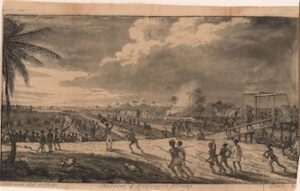
The Demerara rebellion
*The Demerara Rebellion of 1823 began on this date in 1823. This uprising involving about 12,000 African slaves took place in the British colony of Demerara-Essequibo in what is now Guyana.
The rebellion took place a few months after the founding of the Anti-Slavery Society and had a substantial impact on Britain. Although public sentiment initially favored the colonists, it changed with revelations.
In Demerara and Berbice, considerable anger towards the missionaries resulted in their oppression. Demerara's Court of Policy passed an ordinance giving financial assistance to a church selected by plantation owners in each district. The Anglican Church took over the Le Resouvenir chapel. Under pressure from London, the Demerara Court of Policy eventually passed an 'Ordinance for the religious instruction of slaves and for meliorating their condition' in 1825, which institutionalized working hours and some civil rights for slaves. The weekend was from sunset on Saturday to sunrise on Monday; fieldwork was from 6 am to 6 pm, with a mandatory two-hour break. A Protector of Slaves was appointed; whipping was abolished for women, as was its use in the field. The ordinance legalized the rights to marriage, own property, and freedom.
Amendments and new ordinances continued to flow from London, each progressively establishing more civil rights for the enslaved people, but the colonial legislature strongly resisted. Many planters refused to comply with their provisions. The confrontation continued as the planters challenged on several occasions the right of the British government to pass laws binding on the colony, arguing that the Court of Policy had exclusive legislative power within the colony, plantation owners who controlled the voting of the tax disrupted administration by refusing to vote the civil list.
In August 1833, the British Parliament passed the 'Act for the abolition of slavery throughout the British Colonies, for promoting the industry of manumitted slaves, and for compensating the persons hitherto entitled to the services of such slaves,' effective August 1, 1834. Plantation owners of British Guiana received £4,297,117 10s. 6½d. in compensation for the loss of 84,915 enslaved people. The uprising was triggered by a widespread but mistaken belief that Parliament had passed a law that abolished slavery and that the colonial rulers were withholding this.
Instigated chiefly by Quamina Gladstone, an enslaved man from the "Success" plantation, the rebellion involved his father, Quamina, and other senior members of their church group. Its English pastor, John Smith, was implicated. The colonists brutally crushed the largely nonviolent rebellion under Governor John Murray. They killed many slaves: estimates of the toll from fighting range from 200 to 500 men and women. The number of those who participated in the uprising is debatable. The rebellion began and lasted for two days. After the government put down the insurrection, they sentenced another 45 men to death, and 27 were executed. The executed enslaved slaves' bodies were displayed in public for months. Quamina may have been deported to the island of Saint Lucia after the uprising. John Smith, who had been sentenced to death and was awaiting news of his appeal against a death sentence, died in jail.
The abolitionist debate, which had flagged, was galvanized by the deaths of Smith and the 200-500 enslaved men and women. Martial law in Demerara ended in January 1824. News of Smith's death strengthened the abolitionist movement in Britain. In Georgetown, Guyana, a main street was named after Quamina. In 2023, the National Portrait Gallery in London featured a picture of Quamina Gladstone and the enslaved woman Amba in its exhibition.